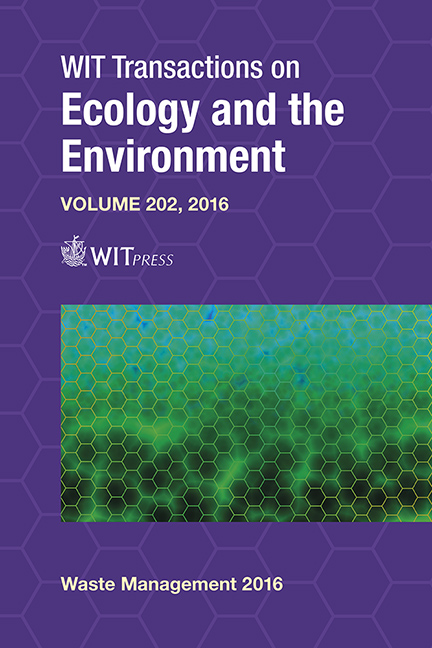Discussion About Citizens’ Cooperation In A New Waste Separation Rule Through A Social Experiment On The Collection Of Separated Food Waste In Toyohashi City, Japan
Price
Free (open access)
Transaction
Volume
202
Pages
11
Page Range
123 - 133
Published
2016
Size
861 kb
Paper DOI
10.2495/WM160121
Copyright
WIT Press
Author(s)
T. Okayama
Abstract
In recent years, especially since the Japan earthquake 2011, recycling and utilization of organic waste attracts attention in Japan. For example, the Ministry of Agriculture, Forestry and Fisheries (MAFF) announced “the biomass industrial town plan” to encourage local biomass industries and the reinforcement of the self-sustaining local energy supply system. In 2012, the Ministry of Economy, Trade and Industry (METI) carried out an Act on Special Measures concerning Procurement of Renewable Electric Energy by Operators of Electric Utilities and began the Feed In Tariff (FIT) that power companies have to buy the generated electricity by renewable energy for 20 years at a fixed price.
In response to such a national request, Toyohashi University of Technology, Nagoya University (later, changed to Taisho University) and Aichi Prefectural Government started an experiment to utilize biogas by methane fermentation of sewage sludge and food waste at the Toyogawa sewage disposal plant in Aichi Prefecture, in October 2011. In the experiment, biogas was used to generate electricity, and the carbon dioxide included in biogas was applied for photosynthesis to accelerate culture of vegetables and seaweed.
In this project, Tomoko Okayama (the author) of Taisho University was in charge of investigating the collection of food waste which became the raw materials for the biogas. From May to July 2014, I carried out a social experiment that approximately 400 households nearby the Toyogawa sewage plant separated food waste at the source, and the food waste was collected to the sewage plant to be anaerobic digested. I will mainly report on this social experiment and analyze the amount of collected food waste, finally have a discussion on citizens’ cooperation to separation of food waste from combustible waste at the social experiment, and provide information that will contribute to real policy making in the city of Toyohashi.
Keywords
food waste, municipal solid waste, separation of waste, social experiment, citizens’ cooperation





